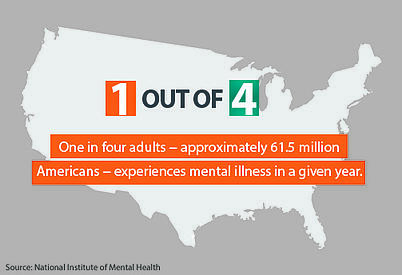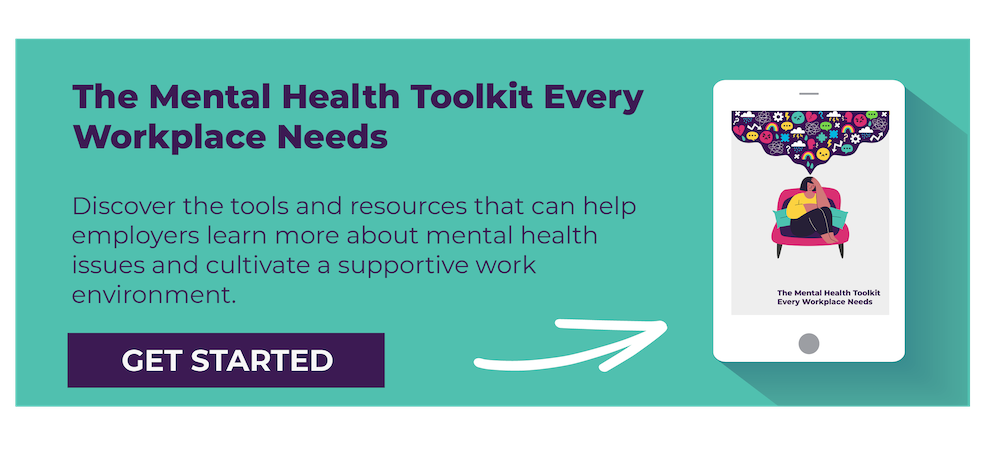 According to the World Health Organization, as many as 450 million people worldwide suffer from a mental or behavioral disorder, and the average costs for employees with depression may be 4.2 times higher than those incurred by a typical employee. Mental health issues such as depression can lead to other health problems and snowball into a hefty chunk of change, both for you and your employee.
According to the World Health Organization, as many as 450 million people worldwide suffer from a mental or behavioral disorder, and the average costs for employees with depression may be 4.2 times higher than those incurred by a typical employee. Mental health issues such as depression can lead to other health problems and snowball into a hefty chunk of change, both for you and your employee.
However, the World Health Organization also says the cost of treatment for these individuals is often completely offset by a reduction in the number of days of absenteeism and productivity lost while at work. Happy and engaged employees work harder, more often, and with better results. Depression not only affects performance, productivity and number of sick days, it can also cause employees to make fewer positive choices for the company and its customers.
The bottom line is that investing in a mentally healthy workforce is good business. It can lower total medical costs, increase productivity, lower absenteeism and presenteeism, and decrease disability costs. So what can you do for your employees to help alleviate this important issue?
First, review your health insurance benefits to make sure mental health is included. Be aware that mental health professionals are often considered specialists by insurance companies, making the copays for your employees much higher than typical doctor’s visits. If possible, look into developing a company program to help your employees with this cost. A visit to a physician, cheaper in copays, can also help the employee get any medication they may need for their depression. Of course, medication can only help with a portion of depression, as many cases are caused by life struggles and an individual’s ability to deal with them, rather than the chemical imbalance that medications address.
Many insurance companies offer Employee Assistance Programs (EAP). These programs can also help employees with many life struggles, including depression, and are typically free or far more cost effective than other options. While severe depression could lead to self-harm and warrants immediate attention, many cases of depression are mild and able to be supported by programs such as the EAP.
Depression and anxiety can also be triggered or worsened by other health issues such as high blood pressure, thyroid problems, obesity, and even lack of sleep. Health risk assessments can help pinpoint some of these other problems. Most treatment for mental health issues boils down to helping the individual make better, healthier decisions for their lives, and health education can get your employees more interested in pursuing the lifestyle choices that lead to healthier, happier lives (and better productivity and business decisions!).
If your company is large enough, a corporate counselor might be a good choice. This individual must have a private office and be allowed to keep all meetings with employees confidential, so they can provide the best help to your employees. Even without this internal counselor, your wellness program could provide mental health awareness and education to employees.
Finally, every great leader inspires his or her employees. A truly inspiring leader is a leader who not only communicates well, but also listens actively. The stigma of depression is often worse than the syndrome itself. If one of your employees comes to you with a concern about depression, make sure they feel heard and respected. Be firm, but gentle and compassionate. Forcing someone to work or threatening them with dismissal when they are having an especially bad day could lead to a panic attack or very poor decision making, even vengeful reactions. But allowing them to stay home and wallow in despair will be unlikely to solve any problems, for them or for your company. Sometimes they do need a day or two off to replenish themselves, but if your employee is missing too many days to be productive, then you should encourage them to seek help.
Depression is very real and very common in this modern era, and affects everyone from CEOs to accountants to bus drivers. As an employer, you can’t fix your employees’ problems but you can help provide perspective and resources for them to find their own solutions. And they will pay you back as engaged, happy and healthy employees with higher productivity, fewer sick days, higher morale, and better decision making, for themselves and for your company.
Is promoting mental health part of your employee wellness program? Share your comments below.



